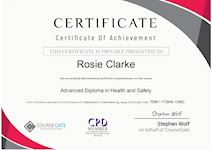Diploma in Renewable Energy - CPD Accredited
Exam Included . CPD Accredited Qualification . Lifetime access . Immediate Result
Course Gate
Summary
- Exam(s) / assessment(s) is included in price
- Tutor is available to students
Overview
This Diploma in Renewable Energy is accredited by CPD and is ideal for all individuals, whether they already work in this field, aspire to or are simply interested in learning more about renewable energy. Designed for both part-time and full-time students, the Diploma in Renewable Energy course is packed into digestible, bite-sized modules and comes with regular tutor support and a free digital certificate, which will work wonders for your CV.
The Diploma in Renewable Energy course begins by introducing you to energy sustainability, climate change and renewable energy technologies. After this, you will learn the connection between energy use and sustainability, how current energy use is contributing to global climate change, the difference between renewable and non-renewable energy sources and how to identify and distinguish between different forms of renewable energy. You will also come to understand the advantages and disadvantages of different renewable energy sources and be given extensive lessons on wind power, photovoltaics, solar and thermal energy, and grid integration. This knowledge can be an asset for professionals who are called on to evaluate the suitability of various sustainable energy options.
Learning Objectives
The primary learning objectives of the Diploma in Renewable Energy are to:
- Give an introduction to renewable energy, including different types of renewable energy.
- Get you acquainted with the vital facts about solar energy.
- Introduce wind power or wind energy and explain what causes wind energy.
- Teach you simple and cost-effective ways to lower energy cost.
- Help you adopt simple practices for being eco-friendly or environmentally friendly.
- Provide a high-quality learning experience, covering crucial areas of renewable energy and its applications.
- Prepare you for an entry-level position in this field and enhance your career prospects in the renewable energy sector.
CPD
Course media
Description
What will you learn in this Diploma in Renewable Energy
Module 1
In this module, you will learn all about What is Renewable Energy? That means a great deal of information and technology has to be collected and evaluated. Many of these methods though continue to see advances in the designs and processing which will result in them being even more valuable in the future than they are right now.
Module 2
This module will teach you about Types of Renewable Energy. When you think about the natural things around us a couple of things come to mind. First, you have the sun that continues to shine brightly in the sky day after day. It gives off a great deal of heat which can be converted into energy.
Module 3
In this module, you will learn all about Solar Power. Solar power is likely to be the most valuable of the renewable energy sources available. That is because it is plentiful and it is the least expensive to implement. New buildings can be built that incorporate the concepts as can homes. There are also solar panels that can be added to what is already in place.
Module 4
This module will teach you about Wind Power. Across the plains where there is open land, the wind is able to move at high speeds. This is due to there not being any buildings or homes in the area to break it up. This is the perfect location for wind power to be generated and collected.
Module 5
In this module, you will learn all about Hydropower. There is also power found in water and that process is referred to as hydropower. It can create much more energy at one time than either solar power or wind power. This is due to the fact that water is so dense.
Module 6
This module will teach you about Biofuel. Biofuel isn’t one of the well-known types of renewable energy but an important one to understand. The process begins when plants go through photosynthesis. There is chemical energy stored inside of it that can be released. What they create is a type of biomass and that can be turned into fuel.
Module 7
In this module, you will learn all about Government Incentives. The Renewable Heat Incentive (RHI) is a UK Government scheme set up to encourage uptake of renewable heat technologies amongst householders, communities, and businesses through financial incentives. It is the first of its kind in the world and the UK Government expects the RHI to contribute towards the 2020 ambition of 12% of heating coming from renewable sources.
Module 8
This module will teach you about Renewable Energy Is Key to Fighting Climate Change. Renewable energy is one of the most effective tools we have in the fight against climate change, and there is every reason to believe it will succeed. A recent New York Times column seems to imply that renewable energy investments set back efforts to address climate change—nothing could be further from the truth. What’s more, renewable technologies can increasingly save customers money as they displace emissions from fossil fuels.
Module 9
In this module, you will learn all about Energy Audits. Results from energy audits provide insight for building owners and also identify the most economical and energy-saving opportunities. Audits alone do not decrease energy usage; energy-saving strategies must actually be applied in order to see results. However, the implementation of these cost-effective opportunities can result in a payback period typically ranging from six months to four years, depending on the savings approaches utilized.
Module 10
This module will teach you about How to Choose Your Renewable Energy Sources. You know you want your new dream home to include some green energy generation, so you can be more independent, save money in the long term, and do your bit for the planet. But how do you know what’s right for you? There are so many factors at work in choosing the best renewable energy system for your site and budget.
Module 11
In this module, you will learn all about Solar Geometry. The Earth’s daily rotation about the axis through its two celestial poles (North and South) is perpendicular to the equator, but it is not perpendicular to the plane of the Earth’s orbit. In fact, the measure of tilt or obliquity of the Earth’s axis to a line perpendicular to the plane of its orbit is currently about 23.5°
Module 12
This module will teach you about Solar Wall. SolarWall was invented by Conserval Engineering’s president, John Hollick in the late 1980s. Conserval decided to focus on building integrated solar heating with its SolarWall invention often referred to as a transpired collector. SolarWall systems are building integrated and consist of perforated metal heating panels mounted on the building’s sun-facing wall. SolarWall heaters were first used to heat and ventilate large buildings with a requirement for ventilation air or fresh air.
Module 13
In this module, you will learn all about Passive Solar Heating.
Passive solar heating uses free heating direct from the sun to dramatically reduce the estimated 40% of the energy consumed in the average Australian home for space heating and cooling (DEWHA 2008).
Most Australian climates require both passive heating and cooling. Many heating and cooling design objectives overlap but the different emphasis is required depending on your climate needs. Read Design for climate before this article to determine your climate zone and get an understanding of the strategies you’ll need. The detailed advice in this article and the one that follows it, Passive cooling, is complemented by advice relevant to specific types of home in the section Before you begin.
What is passive solar heating?
Passive solar heating is the least expensive way to heat your home. Put simply, design for passive solar heating aims to keep out summer sun and let in winter sun while ensuring the building’s overall thermal performance retains that heat in winter but excludes it and allows it to escape in summer.
Module 14
This module will teach you about Solar Water Heaters. Most solar water heaters require a well-insulated storage tank. Solar storage tanks have an additional outlet and inlet connected to and from the collector. In two-tank systems, the solar water heater preheats water before it enters the conventional water heater. In one-tank systems, the backup heater is combined with the solar storage in one tank.
Module 15
In this module, you will learn all about Solar Photovoltaic Technology Basics. Photovoltaic (PV) materials and devices convert sunlight into electrical energy. A single PV device is known as a cell. An individual PV cell is usually small, typically producing about 1 or 2 watts of power.
Module 16
This module will teach you about Other Energy Saving Technologies. Ground source heat pumps (GSHPs) use pipes which are buried in the garden to extract heat from the ground. This heat can then be used to heat radiators, underfloor or warm air heating systems and hot water in your home.
Method of Assessment:
Upon completion of the course, you will be required to sit for an online multiple-choice quiz based assessment, which will determine whether you have passed the course (60% pass mark). The test will be marked immediately and results will be published instantly.
Certification
After successfully completing the course, you will be able to obtain the certificates. You can claim a PDF certificate by paying a little processing fee of £2. There is an additional fee to obtain a hardcopy certificate which is £9.
Who is this course for?
Diploma in Renewable Energy is suitable for anyone who wants to gain extensive knowledge, potential experience and professional skills in the related field.
Requirements
Our Diploma in Renewable Energy is open to all from all academic backgrounds and there are no specific requirements to attend this Diploma in Renewable Energy course. It is compatible and accessible from any device including Windows, Mac, Android, iOS, Tablets etc.
Career path
This Diploma in Renewable Energy course opens a new door for you to enter the relevant job market and also gives you the opportunity to acquire extensive knowledge along with required skills to become successful. You will be able to add our qualification to your CV/resume which will help you to stand out in the competitive job industry.
Questions and answers
How long will I have to complete the course?
Answer:Hi Max, Thanks for your query. This is a self-paced online course. You will have one year of access to the course to complete it after purchasing and you can complete it anytime within a year. Many thanks.
This was helpful.Do I need formal qualifications in the solar energy field?
Answer:Hi Paul, Thanks for your query. This course is personal development course. In the UK if you wish to be fully qualified in the solar energy field you need to do a course regulated by Ofqual which we currently do not offer. Many thanks.
This was helpful.I am living outside the UK, can I do this course?
Answer:Hi Holly, Thanks for your query. Yes, you can do the course from outside UK. Many thanks.
This was helpful.
Reviews
Legal information
This course is advertised on reed.co.uk by the Course Provider, whose terms and conditions apply. Purchases are made directly from the Course Provider, and as such, content and materials are supplied by the Course Provider directly. Reed is acting as agent and not reseller in relation to this course. Reed's only responsibility is to facilitate your payment for the course. It is your responsibility to review and agree to the Course Provider's terms and conditions and satisfy yourself as to the suitability of the course you intend to purchase. Reed will not have any responsibility for the content of the course and/or associated materials.




